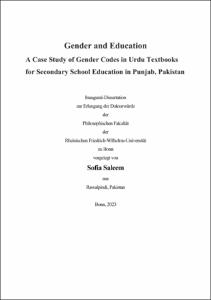Gender and EducationA Case Study of Gender Codes in Urdu Textbooks for Secondary School Education in Punjab, Pakistan

Gender and Education
A Case Study of Gender Codes in Urdu Textbooks for Secondary School Education in Punjab, Pakistan

| dc.contributor.advisor | Youkhana, Eva | |
| dc.contributor.author | Saleem, Sofia | |
| dc.date.accessioned | 2023-08-11T09:51:36Z | |
| dc.date.available | 2023-08-11T09:51:36Z | |
| dc.date.issued | 11.08.2023 | |
| dc.identifier.uri | https://hdl.handle.net/20.500.11811/10978 | |
| dc.description.abstract | This dissertation is a study of the gender codes found within school textbooks in Pakistan. It critically examines Urdu textbooks, published by Punjab Textbook Board, and taught in Urdu-medium public schools at the secondary level (9th and 10th), in Punjab, Pakistan. To investigate the way gender codes affect, I analyzed Urdu textbook lessons and discussed them with male and female teachers in five public schools in Gujar Khan, a town in Punjab. Urdu is a compulsory subject that all pupils in all schools in Pakistan must study to pass their examinations from grade 1 to grade 10. The teaching content of Urdu textbooks includes the prose and poetry of different Urdu writers. The Punjab Textbook Board, following the curriculum guidelines of the Ministry of Education in Pakistan, is responsible for selecting and publishing Urdu textbooks. Therefore, the examination of gender codes within these textbooks is of far-reaching importance. This study aims to uncover and reveal gender codes by employing Fairclough's (1992) text analysis method. The analytical categories adapted for text analysis are behavioral codes, activities codes, occupation codes, and dress codes. The purpose of text analysis of Urdu textbooks is twofold; (a) to find out what gender codes are presented in Urdu textbooks, (b) to find out if these gender codes are discriminatory against males and females. The findings (presented through excerpts and their translations) show that discriminatory gender codes are applied to both males and females. Further, textbook content maintains a biased gender representation which strengthens gender inequalities, including discrimination, stigmatization, exclusion, unequal representation, male hegemony, and symbolic violence. Moreover, the findings of interviews and focus-group discussions show that many male and female teachers support rather than challenge discriminatory gender codes. This study can be useful for policymakers, textbook writers, education practitioners, and teachers, to realize the impact made by gender codes in Urdu textbooks. With this knowledge about gender codes and their impact, an equal, sensitive, and balanced gender approach can be established for girls and boys in public secondary schools in Pakistan. | en |
| dc.language.iso | eng | |
| dc.rights | Namensnennung 4.0 International | |
| dc.rights.uri | http://creativecommons.org/licenses/by/4.0/ | |
| dc.subject | Gender | |
| dc.subject | Education | |
| dc.subject | School Education in Pakistan | |
| dc.subject.ddc | 370 Erziehung, Schul- und Bildungswesen | |
| dc.title | Gender and Education | |
| dc.title.alternative | A Case Study of Gender Codes in Urdu Textbooks for Secondary School Education in Punjab, Pakistan | |
| dc.type | Dissertation oder Habilitation | |
| dc.publisher.name | Universitäts- und Landesbibliothek Bonn | |
| dc.publisher.location | Bonn | |
| dc.rights.accessRights | openAccess | |
| dc.identifier.urn | https://nbn-resolving.org/urn:nbn:de:hbz:5-71737 | |
| ulbbn.pubtype | Erstveröffentlichung | |
| ulbbnediss.affiliation.name | Rheinische Friedrich-Wilhelms-Universität Bonn | |
| ulbbnediss.affiliation.location | Bonn | |
| ulbbnediss.thesis.level | Dissertation | |
| ulbbnediss.dissID | 7173 | |
| ulbbnediss.date.accepted | 16.05.2023 | |
| ulbbnediss.institute | Zentrale wissenschaftliche Einrichtungen : Zentrum für Entwicklungsforschung (ZEF) | |
| ulbbnediss.fakultaet | Philosophische Fakultät | |
| dc.contributor.coReferee | Blasius, Jörg | |
| ulbbnediss.contributor.gnd | 1328154084 |
Files in this item
This item appears in the following Collection(s)
-
E-Dissertationen (712)




